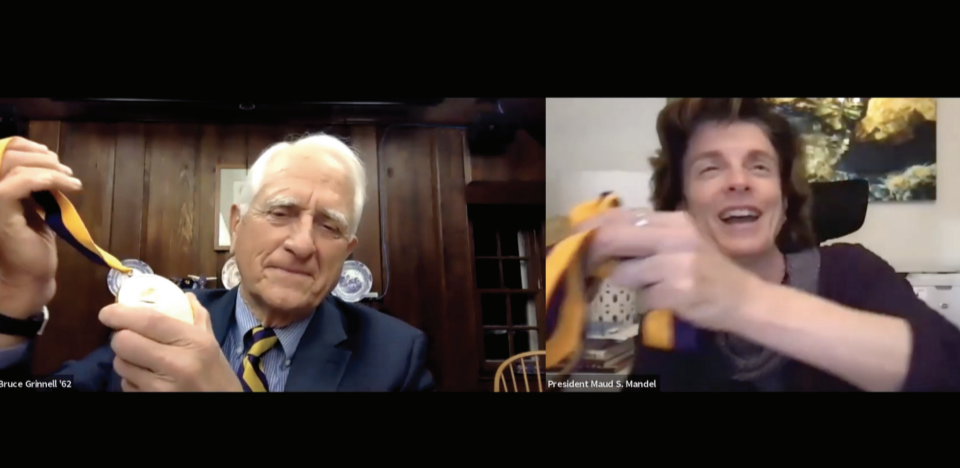Mandel awards Bicentennial Medal to Bruce Grinnell ’62 for his role in abolishing fraternities at the College
December 1, 2021

President Maud S. Mandel awarded the Bicentennial Medal to Bruce Grinnell ’62 during a Nov. 22 Zoom webinar for his role in abolishing fraternities at the College.
The Bicentennial Medal was established in 1993 to “honor members of the Williams community for distinguished achievement in any field of endeavor.” Since it was first conferred in 1993, five to seven people have received this honor annually.
During the event, Grinnell was joined by Stephen Lewis ’60, who was a professor of economics at the College from 1966 to 1987. After attending law school at Boston University, Grinnell started a local law firm, Grinnell Partners, in 1971 and stewarded it until his retirement in 2020.
Lewis started the conversation by discussing the history of fraternities at the College. By the 1950s, the fraternity system had dominated the College for over a century, Lewis said. After being introduced to the College in the 1830s as literary clubs, these social organizations slowly evolved to become full fraternities with national affiliations by the early 1900s.
In 1951, the College established a rule prohibiting students from joining fraternities until their sophomore year, but fraternities continued to dominate social life — so much so that students who could not secure a bid to join one of the 15 fraternities would most likely be recommended to transfer to a different college, according to Lewis.
Grinnell arrived at the College in 1958 and became captain and quarterback of the football team. During his first two years, discontent with the fraternity system within the College community remained relatively undiscussed, Grinnell said. It was perhaps most visible with members of the faculty, many of whom believed that the fraternities exercised an “anti-intellectual” influence.
In 1961, Grinnell said, his fraternity was assigned an international student from North Korea, Myong-Ku Ahn ’63. More commonly known as “Charlie,” a perpetuation of a World War II stereotype, the fraternity allowed Ahn to be a social member: to socialize and eat but not sleep at the fraternity house. His willingness to volunteer for various activities attracted Grinnell’s attention, who had recently taken over the fraternity’s presidency.
In April 1961, Grinnell’s proposal for full membership for Ahn came up for a vote. To Grinnell’s horror, the fraternity did not vote to admit Ahn. One member made the comment that “If Charlie lived here, I couldn’t bring a date here.”
“I was struck. I don’t think I ever confronted any forms of racism, and this just pushed me over the edge, in a sense,” Grinnell said. “The meeting broke up. It was a little contentious, and I went back to the freshman quad where I was a Junior Advisor and started talking to the other Junior Advisors to find out if this thing happened at other fraternities. The answer was, ‘Yes,’ but interestingly you never heard about it on campus.”
Grinnell subsequently organized a meeting with other Junior Advisors and anyone else who was interested in addressing the fraternity system’s injustices. By the time that group met for the third time, it had a written petition that called for the fraternities’ abolition.
Of the 900 people eligible to sign the petition, 46 or 47 did. Now known as the Grinnell Petition, this document was submitted to then-President of the College James Phinney Baxter in May 1961.
Despite his central role in the Grinnell Petition’s formation, Grinnell emphasized at the award event that the petition was a collective endeavor. “These young men at the time [who signed the petitions] were among the best Williams had to offer,” Grinnell said. “They were serious students. Some were presidents of their fraternities, some were editors of the Record. So, there was a gravitas to this group that allowed [the next College president, Jack Sawyer ’39] to go forward with this petition in 1961.”
Shortly after Sawyer was appointed to the presidency, he informed Grinnell that he would be one of two undergraduates appointed to a committee — known as the Angevine Committee after its chairman, Jay Angevine, Class of 1911 — that would investigate the role of fraternities at the College.
Grinnell said he was initially hesitant about the impact this committee would have on the fraternity system. The list of committee members’ names contained only two alums who graduated after World War II and one non-affiliate. However, the committee, Grinnell said, “was made up of some of the most interesting, loyal, thoughtful Williams graduates that you can imagine… Their loyalty, even though most of them were fraternity people, was with Williams.”
After several meetings during Grinnell’s senior year, some of which were markedly tense, the Angevine Committee reached a consensus in May 1962: It would recommend that the College — not fraternities — should assume responsibility for feeding and housing all of its students. Fraternities gradually collapsed over the coming years, and the College officially banned fraternities in the late 1960s.
Grinnell said he felt social repercussions for his transformative role in the abolition of fraternities, especially with regard to his participation on the Angevine Committee. “I probably should have left the [fraternity] house,” Grinnell said. “I lived in the house my senior year.”
“There were some aspects of senior living that were difficult,” he added. “Eight-four percent of the undergraduate body wanted to maintain fraternities, so, generally speaking, it was a long year, put it that way.”
Mandel lauded the lasting impact of Grinnell’s work when she conferred the Bicentennial Medal onto him. “You were just doing what you thought was right,” Mandel said. “From a humble, working-class kid from Northampton, Massachusetts, it probably felt that simple. You couldn’t have known that your actions in the spring of 1961 would alter the trajectory of your college and etch your name into Williams history, but that’s exactly what happened.”








